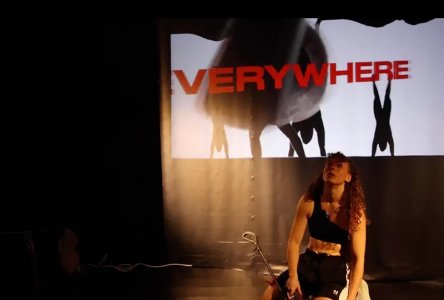
MCGUFFIN PARK
MCGUFFIN PARK, Ensemble Theatre Kirribilli, 18 October–23 November 2024. Photography: Prudence Upton - above - McGuffin's council; below - Jamies Oxenbould, Lizzi Schebesta, Shan-Ree Tan; below again - Oxenbould, Eloise Snape, Schebesta
Clad in comically drab apparatchikwear enlivened by an occasional crisp white shirt, on-and-off-again neck tie or extreme cultist camo, the five actors in Sam O’Sullivan’s new comedy work hard and to great effect across a kaleidoscopic representation of small town politics. The play also works hard, from its tongue-in-cheek Brechtian beginnings through situations and cheeky hints that leap from Alan Ayckbourn to Jonathan Biggins, to Michael Frayn, plus whiffs of Utopia.
The small NSW town of McGuffin Park is thrown into turmoil (its dozen or so earnest pollies, that is) when the Mayor suddenly resigns leaving a vacuum into which rushes newly-kindled ambition and sudden rivalry. Eloise Snape is independent councillor and muffin queen Fiona, while Shan-Ree Tan is fellow councillor Jack, her best bud from primary and a hopeful in “the Party” (O’Sullivan avoids naming Labor and Liberal by calling the other lot “the Other Party”).

Also on Council is the local publican and would-be developer Eric. Played by Jamie Oxenbould with his customary wicked sparkle, he also trebles as coach of woeful footy team the McGuffin Hogs … and as Brecht. Lizzie Schebesta takes her voice down half an octave as another local worthy, Dave, editor and chief (only) reporter of the local paper. Thomas Campbell is shockingly likely as a sovereign citizen ratbag gunshop owner as well as elderly lady Bridget; and these three also flip between school kids, footy players, shoppers and a frock-wearing gentleman councillor. All of small-town life is here.
Director Mark Kilmurry mushes his team at an agreeably cracking pace. It suits the satirical, one-liner sprinkled style of the play and the actors toss around quips, witticisms, acid drops and character changes with no hint of stumble. Simon Greer’s single setting of the Town Hall interior – a recognisable mix of nice flooring, institutional paint job and fittings – gives room to move with a few chairs and a table coming and going when the lectern isn’t centre-stage. Trudy Dalgleish’s lighting skilfully signals passing time and place, while Jessica Dunn’s music and sound design add to the small-town ambience.

However, none of all this excellent work – and the frequent laugh-fest – can conceal that the first half is too long, neither quite funny nor dramatic enough, and some 10-12 minutes could be cut without any harm. This is particularly evident as the shorter, darker, more urgent second half plays out. Sovereign citizen Banjo (Thomas Campbell) electrifies what has been an entertaining but not especially startling evening.
Banjo/Campbell and the twists in plot and characters suddenly revealed suggest another play entirely is lurking, post-interval, to be explored. Meanwhile, there’s a lot to like about McGuffin Park – and its glorious ambition is part of that. The irony and optimism are welcome too.

-c444x300.jpeg)

